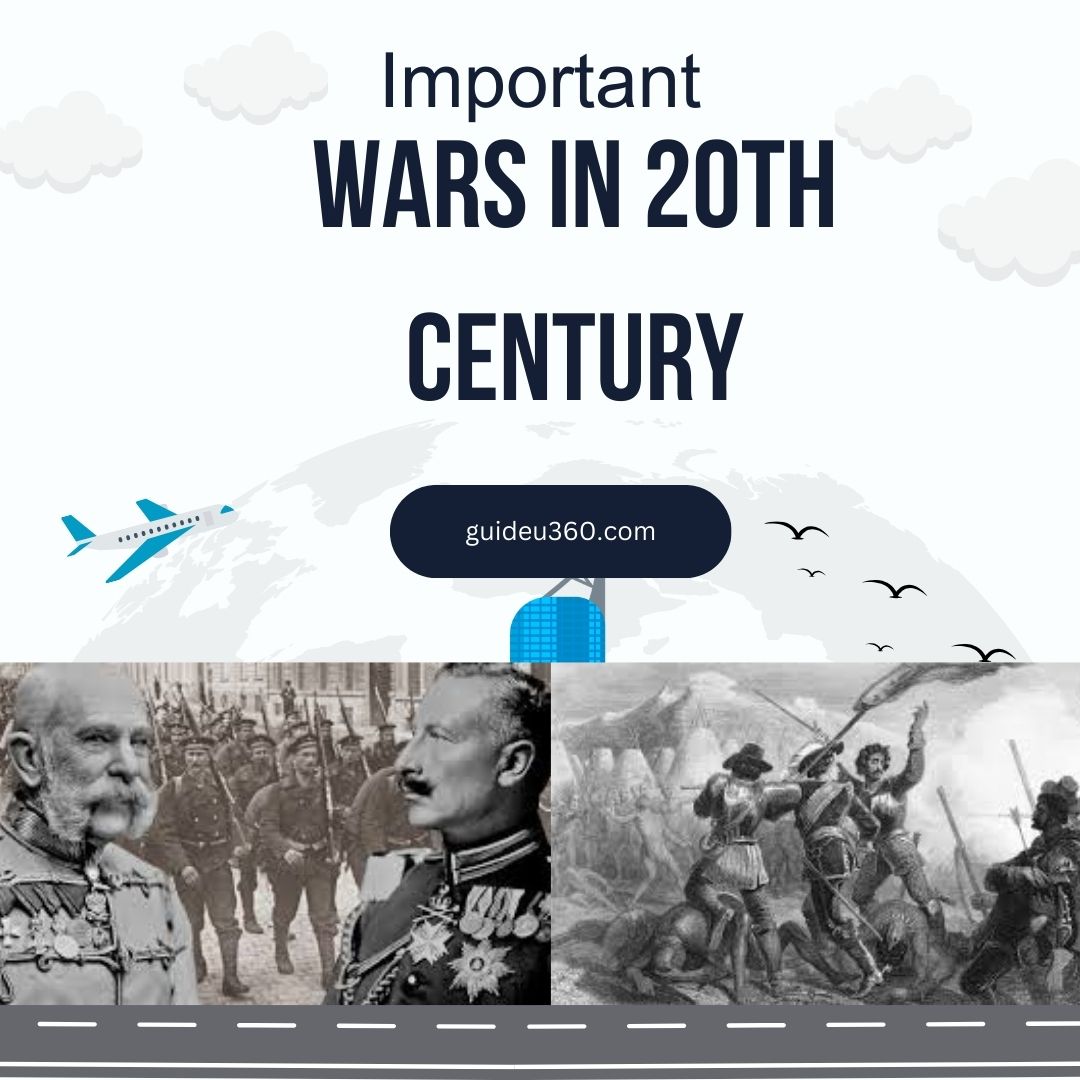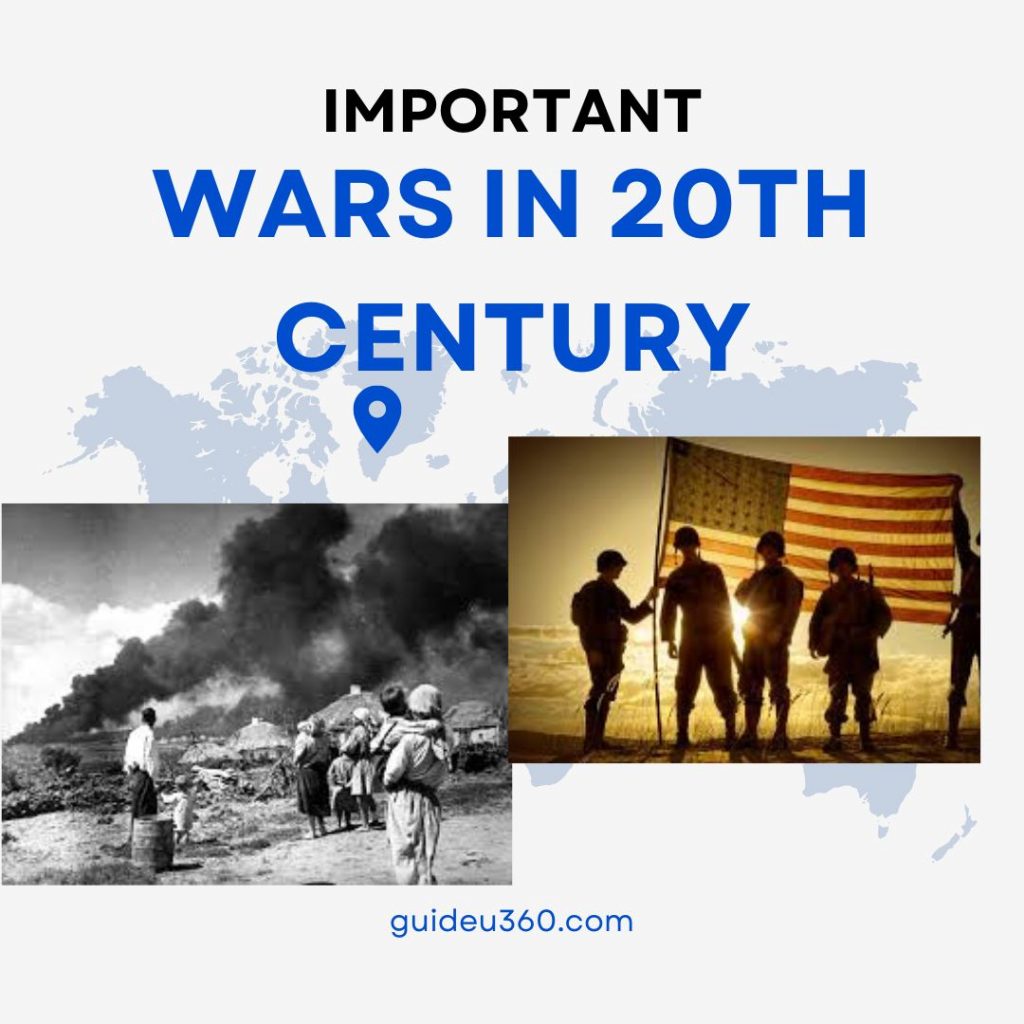The 20th century was marked by significant conflicts that shaped the geopolitical landscape of the modern world. These wars had far-reaching consequences, affecting millions of lives and altering the course of history. Here is an overview of some of the most important wars of the 20th century:

World War I (1914-1918)
World War I, also known as the Great War, was a global conflict that primarily involved European nations but eventually included many countries worldwide. The war was triggered by the assassination of Archduke Franz Ferdinand of Austria-Hungary and involved two major alliances: the Allies (led by France, Russia, and the United Kingdom) and the Central Powers (led by Germany, Austria-Hungary, and the Ottoman Empire).
Key Events:
- Battle of the Marne: A significant Allied victory that halted the German advance into France.
- Trench Warfare: Characterized much of the fighting on the Western Front, leading to a prolonged and grueling conflict.
- Use of New Weapons: Introduction of tanks, machine guns, and chemical weapons.
Outcome: The war ended with the signing of the Treaty of Versailles in 1919, which imposed heavy reparations and territorial losses on Germany. The war resulted in significant political changes, including the fall of empires (Austro-Hungarian, Ottoman, German, and Russian) and set the stage for World War II.
World War II (1939-1945)
World War II was the most widespread and deadliest conflict in history, involving more than 100 million people from over 30 countries. The war began with the German invasion of Poland and saw the Axis Powers (Germany, Italy, and Japan) clashing with the Allies (led by the United States, the Soviet Union, and the United Kingdom).
Key Events:
- Invasion of Poland: Marked the beginning of the war.
- Battle of Britain: A significant air battle where the British Royal Air Force defended the UK from German Luftwaffe attacks.
- Pearl Harbor Attack: Prompted the United States to enter the war.
- D-Day Invasion: Allied forces landed on the beaches of Normandy, leading to the liberation of Western Europe.
- Atomic Bombings: The United States dropped atomic bombs on Hiroshima and Nagasaki, leading to Japan’s surrender.
Outcome: The war ended with the unconditional surrender of the Axis Powers. It led to significant geopolitical changes, including the establishment of the United Nations, the beginning of the Cold War, and the decolonization of Asia and Africa.
Korean War (1950-1953)
The Korean War was a conflict between North Korea (supported by China and the Soviet Union) and South Korea (supported by the United Nations, particularly the United States). The war began when North Korean forces crossed the 38th parallel and invaded South Korea.
Key Events:
- Battle of Inchon: A successful amphibious operation led by General Douglas MacArthur that recaptured Seoul.
- Chinese Intervention: China’s entry into the war turned the tide in favor of North Korea.
Outcome: The war ended in an armistice, with the Korean Peninsula remaining divided at the 38th parallel. The conflict resulted in significant casualties and established the Demilitarized Zone (DMZ) that still exists today.

Vietnam War (1955-1975)
The Vietnam War was a protracted conflict between communist North Vietnam (supported by the Soviet Union and China) and South Vietnam (supported by the United States and other anti-communist allies). The war was part of the larger context of the Cold War and the fight against the spread of communism.
Key Events:
- Tet Offensive: A major campaign by North Vietnamese forces that significantly impacted public opinion in the United States.
- My Lai Massacre: The killing of hundreds of unarmed Vietnamese civilians by U.S. soldiers, which fueled anti-war sentiment.
Outcome: The war ended with the fall of Saigon in 1975, leading to the reunification of Vietnam under communist control. The conflict had a profound impact on American society and foreign policy.
Falklands War (1982)
The Falklands War was a short but intense conflict between Argentina and the United Kingdom over the disputed Falkland Islands. The war began when Argentina invaded the islands, prompting a British military response.
Key Events:
- Battle of Goose Green: A significant British victory that boosted morale.
- Sinking of the ARA General Belgrano: A controversial action by the British Navy.
Outcome: The war ended with the British recapturing the islands. The conflict had lasting effects on both countries, bolstering British national pride and leading to political changes in Argentina.
Important Awards in India and World
Gulf War (1990-1991)
The Gulf War, also known as Operation Desert Storm, was a conflict between Iraq and a coalition of countries led by the United States. The war was triggered by Iraq’s invasion of Kuwait.
Key Events:
- Operation Desert Shield: The buildup of coalition forces in the Persian Gulf.
- Operation Desert Storm: The combat phase that involved a massive air and ground assault.
Outcome: The war ended with a decisive victory for the coalition forces, leading to the liberation of Kuwait. The conflict had significant implications for Middle Eastern politics and U.S. foreign policy.





